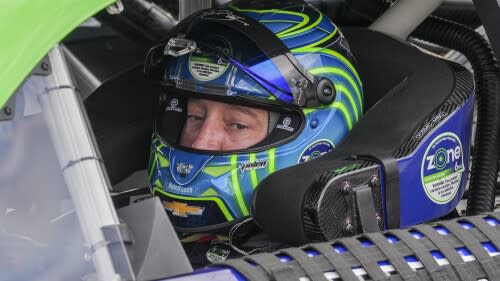Dr. Diandra: Kyle Busch fans shouldn’t worry about his 37-race winless streak
Kyle Busch is mired in the longest winless streak of his career at 37 races. Could such a long losing streak be the first sign that the two-time champion driver is entering the twilight of his career?
Probably not. In fact, this isn’t Busch’s first experience with a 30+ race winless run in his 694-race career. He had:
A 36-race losing streak in 2016 to 2017
A 35-race losing streak from 2014 to 2015
A 34-race losing streak in 2007-2008.
A 33-race losing streak in 2020
This might sound horrible to someone used to stick-and-ball sports where there are only two teams and one wins. NASCAR isn't like that. NASCAR has no equivalent to “batting 0.500.”
We can, however, compare Busch’s numbers to those of the other drivers racing against him.
Kyle Busch’s Cup winless drought now longest of his career, but he moves closer to playoff spot
Two-time Cup champions Kyle Busch and Joey Logano remain outside a playoff spot with 10 races left in the regular season.
Active drivers with the longest losing streaks
Many drivers’ longest winless streaks happen between their first and second wins.
Sometimes that’s because a first win earns a newcomer a top-notch ride that takes them a few years to grow into. Drivers can also have extended times between first and second wins if they’re forced to move to a less-well-equipped team.
Chris Buescher has the dubious honor of holding the longest winless streak among active full-time Cup Series drivers. While the Texas native ran only 26 races before winning at Pocono in 2016, it would be another 222 races before his second victory at Bristol in 2022.
Since that second victory, Buescher’s longest winless streak is 28 races. He’s amid a 26-race winless streak at present, but those numbers reflect luck more than performance. He lost Darlington after last-lap contact with Tyler Reddick, and lost at Kansas the week before by just 0.001 seconds in the closest finish in NACSAR history.
Martin Truex Jr. holds the second-longest winless streak of active full-time Cup Series drivers with a 218-race gap between his first and second wins. That second win was followed by a 68-race gap to his third win in 2015 at Pocono.
Ricky Stenhouse, Jr. has a different profile. He won his first two races with only a six-race gap in-between. But he needed another 199 races between his second 2017 win and his 2023 Daytona 500 win.
Justin Haley has only one win in 124 races, but that win (at Daytona) was 121 races ago. Drivers whose first wins are at superspeedways or road courses often have a long time before their second win — if there is a second win.
That brings us to the 110-race winless streak Brad Keselowski ended at Darlington this year. But remember that Keselowski left proven winner Penske Racing for a struggling RFK Racing. During his time with Penske, Keselowski’s longest winless streak was only 37 races. The 110-race drought is more a reflection of the time it’s taken to rebuild the company than of Keselowski himself.
What about drivers with fewer long losing streaks?
Compared to the previous cases, Busch’s longest winless streak being just 37 races is a testament to his skill and the quality of the rides he’s earned. It's a challenge to find drivers at the same points in their careers who haven't had longer losing streaks.
After a 103-race winless streak between Joey Logano’s first and second wins, his longest winless streak is the current 47-race run that started after winning the spring 2023 race in Atlanta.
Denny Hamlin provides the closest comparison. His longest winless streak is 50 races, which happened all the way back in 2008-2009. Since 2019, he’s had gaps of 30 and 32 races without a win.
Most drivers with a smaller number of races on their resume haven’t had time to hit too many extended winless runs.
After winning his first race in 2018, Chase Elliott hasn’t gone more than 42 races without winning. That includes Elliott's injury-interrupted 2023 season.
Ross Chastain also hasn’t gone longer than 42 races without a win since first doing so.
William Byron has never had a winless streak longer than 37 races since his first victory.
Tyler Reddick took 91 races before he won his first but hasn’t gone longer than 21 races without winning since.
Winless streaks can come at any time in a driver’s career. They often depend just as much on equipment, owner and luck as on driver skill. The numbers, however, are of little comfort to drivers worrying that their last career win might already be in the rear-view mirror.
The Data
I’ve written previously about how the rate at which a driver accumulates wins reveals a lot about their overall career trajectory. To understand what losing streaks might signify, I plotted drivers’ cumulative wins versus the number of races run, as shown in the bottom part of the graph below for Busch.

I then added a horizontal red graph to highlights winless periods. I labeled losing streaks long enough that the number would fit. Finally, I included the years along the top to place the entire dataset in context.
I only include races the driver ran. For example, the races Busch missed in 2015 due to injury don’t count toward a losing streak.



